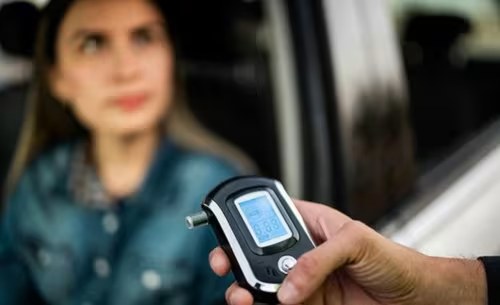Disclaimer: This guest post was written by a third party and is for informational purposes only. It does not constitute legal advice or create an attorney-client relationship with The Meehan Law Firm. For legal advice, please contact our office.
.jpg)
.jpg)
Driving under the influence (DUI) in California is a serious offense, but when you have a prior DUI conviction within 10 years, things get even more complicated and the penalties become much harsher. Vehicle Code VC 23550.5 lays out the consequences for repeat offenders.
What Is Vehicle Code VC 23550.5?
Vehicle Code VC 23550.5 may apply if you’re charged with a DUI and have one or more prior convictions for DUI-related offenses–if the arrests on those prior cases occurred within 10 years of the arrest date for the new charge. In other words, the “lookback period” for DUI priors is from arrest date to arrest date, regardless of conviction date.
A DUI offense can be charged as a felony if there is a history of prior DUI convictions, even if the current DUI would typically be a misdemeanor. The penalties for a felony DUI conviction include potential state prison time of up to three years, significant fines, and a lengthy driver's license suspension.
VC 23550.5 applies to prior DUI-related offenses involving motor vehicles: DUI, DUI causing injury, vehicular manslaughter related to alcohol or drug impairment, and even VC 23103/23103.5 “wet reckless.”
Prior Offenses That Count Under VC 23550.5
Under VC 23550.5, previous offenses that count for this charge include:
- DUI (Vehicle Code 23152): Driving under the influence of alcohol or drugs. Three prior convictions make the fourth DUI charge a felony.
- DUI Causing Injury (Vehicle Code 23153): If your DUI causes injury to someone else.
- Vehicular Manslaughter (Penal Code 192): Convictions related to DUI that resulted in someone’s death
- Any felony DUI charge within the past 10 years, regardless of injury.
- VC 23103/23103.5 “wet reckless.”
What Are the Penalties Under VC 23550.5?
If Vehicle Code VC 23550.5 applies to a case in California, the punishment carries more severe penalties. Under this code, the DUI is elevated to a felony, even if the new charge would typically be a misdemeanor. Possible punishment can include up to three years in state prison, substantial fines ranging from $390 to $1,000 (plus court costs), and a license suspension that could last up to four years. DUI education programs may also be a part of the sentence together with probation. VC 23550.5 significantly raises the penalties for repeat offenders, making it essential for those affected to fully understand the situation and seek legal guidance to explore potential defense options.
Aggravating Factors Can Make It Worse
Certain circumstances can make the penalties under Vehicle Code VC 23550.5 even tougher. An example is having a high blood alcohol content (BAC), typically 0.15% or higher, or driving under the influence with a child passenger under the age of 14. This often leads to additional charges for child endangerment. If the DUI causes an accident or injury to another person, or if there is property damage, the penalties are likely to be even more severe. Excessive speed or reckless driving while intoxicated can also worsen the outcome, as can having prior felony DUI convictions. These aggravating factors can lead to longer prison sentences, higher fines, and stricter probation conditions, making the consequences much more severe than for a standard DUI.
Can You Fight a VC 23550.5 Charge?
Yes, a qualified DUI defense attorney who specializes in DUI cases and knows the ins and outs of California DUI laws will know different strategies that may help reduce or dismiss the charges. A good attorney will have the skill to know what to look for, evaluate the specifics of the case, including the legality of the traffic stop, the accuracy of BAC test results, or dispute prior convictions, or dispute out of state prior convictions, among other tactics.
If the charges don't result in dismissal, another approach is to negotiate for lesser penalties. A defense attorney might pursue options like:
- Plea Bargain: The defense team may negotiate with the prosecution for a plea deal, potentially reducing the charge to a misdemeanor or to a lesser offense, like a wet reckless (a lower-level DUI-related charge).
- Probation or Alternative Sentencing: In some cases, instead of prison time, the attorney might advocate for probation, community service, residential treatment, or participation in DUI education programs. This is more likely to be the case if there were no additional aggravating factors, like causing injury.
Facing a DUI charge under Vehicle Code VC 23550.5 can feel overwhelming, especially with the severe penalties on the line. It's important to understand that while the law is tough on repeat offenders. Securing a skilled DUI defense attorney who understands the complexities of California's DUI laws and can craft a strategy tailored to your case can make all the difference. Whether it’s fighting the charge through legal defenses or negotiating for lesser penalties, there are pathways that can help reduce the impact.
(844) 4-DUI STOP
Categories
Need Help?
Free Consultation, discreet, and no obligation- talk to an attorney.
More Blogs

How Can You Defend Someone Who Is Guilty?
Defense attorneys protect constitutional rights, ensure due process...
Read More..
Why a Second DUI Might Be Your Wake-Up Call
Facing a Second DUI in California: Why It Should Be Your Wake-Up Call..
Read More..
How To Spot a Bad DUI Lawyer in 10 Minutes or Less
Choosing the Right DUI Lawyer in California: Spotting Red Flags Early...
Read More..



